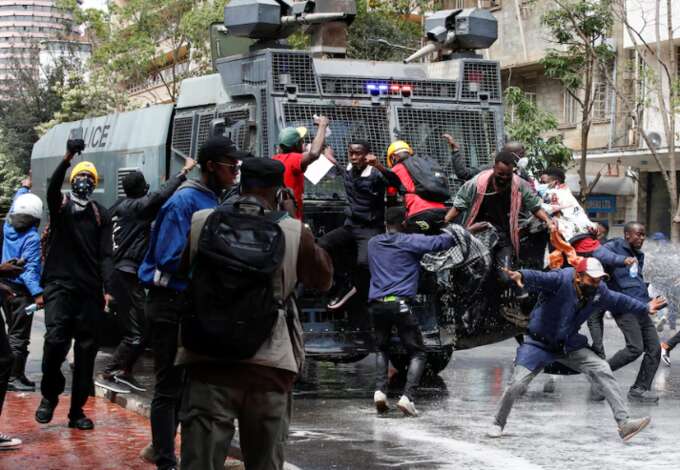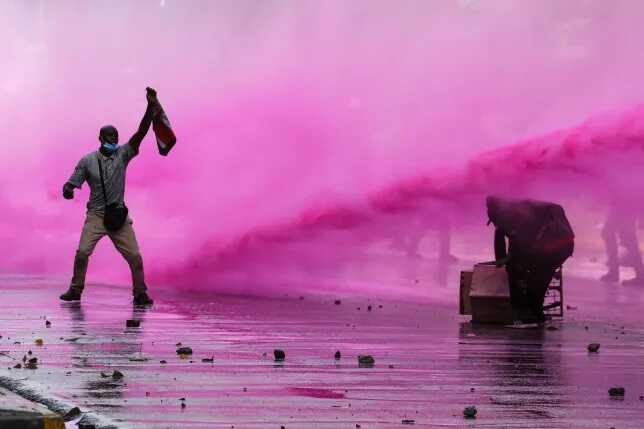Police in Nairobi opened fire after tear gas and water cannon failed to disperse the crowds. They eventually managed to drive protesters from the parliament building and lawmakers were evacuated through an underground tunnel, local media said.
Later on Tuesday, Defence Minister Aden Duale said the army had been deployed to help the police deal with a "security emergency" which had resulted in the "destruction and breaching of critical infrastructure".
A Reuters journalist counted the bodies of at least five protesters outside parliament.
The Kenya Medical Association said that at least five people had been shot dead while treating the injured, and that 31 people had been injured, with 13 shot with live bullets and four with rubber bullets.
The association called on authorities to establish safe medical corridors to protect medical staff and ambulances.
CAUGHT BETWEEN COMPETING DEMANDS
Ruto won an election almost two years ago on a platform of championing Kenya’s working poor, but has been caught between the competing demands of lenders such as the International Monetary Fund, which is urging the government to cut deficits to obtain more funding, and a hard-pressed population.
Kenyans have been struggling to cope with several economic shocks caused by the lingering impact of the COVID-19 pandemic, the war in Ukraine, two consecutive years of drought and depreciation of the currency.
The finance bill aims to raise an additional $2.7 billion in taxes as part of an effort to lighten Kenya’s heavy debt load, with interest payments alone consuming 37% of annual revenue.
In Washington, the White House said the United States was closely monitoring the situation in Nairobi and urging calm.
Ambassadors and high commissioners from countries including Britain, the U.S. and Germany said in a joint statement they were deeply concerned by violence they had witnessed during recent anti-tax protests and called for restraint on all sides.
Kenyan activist Auma Obama, the half-sister of former U.S. President Barack Obama, was among protesters tear-gassed during the demonstrations, a CNN interview showed.
Internet services across the East African country experienced severe disruptions during the police crackdown, internet monitor Netblocks said. Kenya’s leading network operator Safaricom said outages had affected two of its undersea cables but the root cause of the outages remained unclear.

Demonstrators try to obstruct a police vehicle as police use water cannons to disperse protesters during a demonstration against Kenya’s proposed finance bill 2024/2025 in Nairobi, Kenya, June 25, 2024. REUTERS/Monicah Mwangi Purchase Licensing Rights
Parliament approved the finance bill, moving it through to a third reading by lawmakers. The next step is for the legislation to be sent to the president for signing. He can send it back to parliament if he has any objections.
Opposition politicians called on Ruto to step down.
"Ruto must go, Ruto must resign, he must do the honourable thing," senior opposition leader Eugene Wamalwa said in a statement on TV.
Another opposition leader, Raila Odinga, urged the immediate withdrawal of the finance bill to make way for dialogue.
"I am disturbed at the murders, arrests, detentions and surveillance being perpetrated by police on boys and girls who are only seeking to be heard over taxation policies that are stealing both their present and future," he said in a statement.
The government has made some concessions, promising to scrap proposed new taxes on bread, cooking oil, car ownership and financial transactions. But that has not been enough for protesters.
The finance ministry says the concessions would blow a 200 billion Kenyan shilling ($1.56 billion) hole in the 2024-25 budget, and compel the government to make spending cuts or raise taxes elsewhere.
Tuesday’s protests began in a festival-like atmosphere but as crowds swelled, police fired tear gas in Nairobi’s Central Business District and the poor neighbourhood of Kibera. Protesters ducked for cover and threw stones at police lines.
Police also fired tear gas in Eldoret, Ruto’s hometown in western Kenya, where crowds of protesters filled the streets and many businesses were closed for fear of violence.
Further clashes broke out in the coastal city of Mombasa and demonstrations were held in Kisumu, on Lake Victoria, and Garissa in eastern Kenya, where police blocked the main road to neighbouring Somalia’s port of Kismayu.
In Nairobi, people chanted "Ruto must go" and crowds sang in Swahili: "All can be possible without Ruto". Music played from loudspeakers and protesters waved Kenyan flags and blew whistles in the few hours before the violence escalated.
Police did not respond to Reuters requests for comment.
ORGANIC MOVEMENT
Thousands had taken to the streets of Nairobi and several other cities during two days of protests last week as an online, youth-led movement gathered momentum.
Protests in Kenya have usually been called by political leaders who have been amenable to negotiated settlements, but the young Kenyans in the current demonstrations have no official leader and they have been growing increasingly bold in their demands.
While protesters initially focused on the finance bill, their demands have broadened to demand Ruto’s resignation.
Amid the unrest, Kenya’s sovereign dollar bonds slid on Tuesday afternoon, Tradeweb data showed. The 2034 maturity fell the most, trading 0.6 cents lower at 74.7 cents on the dollar.
"They are budgeting for corruption," said protester Hussein Ali, 18. "We won’t relent. It’s the government that is going to back off. Not us."
The Reuters Daily Briefing newsletter provides all the news you need to start your day. Sign up here.
Reporting by Duncan Miriri, Aaron Ross, Hereward Holland, George Obulutsa and Humphrey Malalo Writing by Angus MacSwan and Sharon Singleton Editing by Timothy Heritage, Peter Graff, William Maclean and Mark Heinrich



































